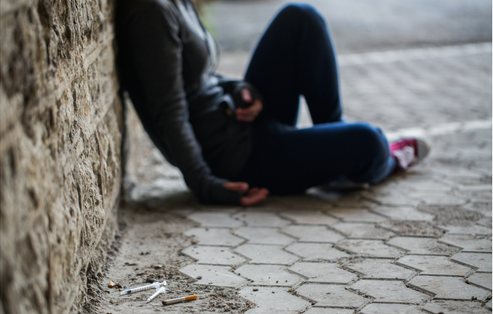We are in the grips of spiritual warfare. While God is our source of life and salvation, the enemy uses some of our God-given desires to pull us away from His sunlight. One of the paramount tools that is used in this fight against good is addiction. Often starting as a brief source of relief to discomfort, the user takes actions to seek that relief more and more even amidst growing consequences. A cycle of addiction (which often circles through indulgence, self-hating regret, momentary resistance, then back to indulgence) takes away our freedom and, in many ways, our free will.
Cardinal Justin Rigali describes this pattern as he writes, “The repetition goes beyond the seeking of pleasure and becomes a series of self-defeating, shaming-and-blaming behaviors that compound stress rather than alleviate it. The person loses more and more control of his or her life as the time devoted to the addiction increasingly becomes a primary focus. The pattern is repeated so often and the person becomes accustomed to it on so many internal and external levels that they are virtually chained to the addictive behavior.”[i]
This is an illogical and insane aspect of addiction that is at its essence. If you are not one that has had the experience of being in the grips of an addiction, then this should make no sense to you. It makes no sense to the onlooker, but the untreated addict suffers from a cycle that spins out of control where the only remedy for the pain it creates seems to be the source of our pain: alcohol, drugs, pornography, overeating, gambling, sex, or the notion that we can fix the person spinning out of control. The pain triggers a seemingly unquenchable thirst to escape, and instantly our minds respond with the thought of our drug (whatever that may be). As if no other feasible options exist, we immediately respond mentally, emotionally, and physically.
Mental obsession about the relief promised by the first “hit” seldom fades on our own merit. The chatter in our heads—the voice that assures us we can’t live without feeding the craving—can’t be silenced and we go to great lengths to get what we feel we need. All the logic that tells us why it is not a good idea is boxed out and typically goes unheard. Sure, our shame will use this logic against us later on to remind us that we’re not worthy of a better way of life. It will make us believe that we simply need to exert our will more, ignoring the truth that left to our devices we are bound to stay stuck in this dark wheel. Instead of making decisions that would aid our escape from the addiction, we instead try to manipulate situations so that our addiction can be protected.
Tension seems to mount the longer we have to wait to get our fix. No longer are we emotionally available to anything else other than filling the hole that rests within us. Anxiety may rise while self-pity and the effects of our pride start steering the wheel. “Why am I doing this?” could also be the predominant feeling while we’re locking ourselves back in our prison cell with no good answer to the question. Some may get to the point where jitters exist if there is too much time between the start of obsession and getting our first “hit”. In the case of the pornography or sex addict, the need to feel intimacy (even in its cheapest form) grows. We look for our addiction to connect us, although all it does is isolate. It furthers us from human or divine interaction. We hide from the truth and put up walls that distance us from God and others. If you’ve ever heard another person say, “You love [your source of addiction] more than you love me,” then you know exactly what I am referring to.
Physically, addiction takes us out of relationship with others. In my case, I isolated to keep my addiction in the dark. There were many moments when I chose drinking or using drugs by myself rather than surrounding myself with those who truly cared about me. Family holidays were missed or tarnished because of the chaos that I brought upon myself and my family. Moreover, one of the components of addiction is a physical tolerance to the substance we are addicted to. Thus, it takes more and more to achieve the same desired result. This can be the cause of physical (and emotional) withdrawals that take place when the addict stops for a short time, and often makes a transition to sobriety much more difficult.
The mental, emotional, and physical response to some real or imagined stimulus locks us into a way of life where our freedom is diminished. This does not prove to excuse us from accountability for our actions or sinfulness, but exposes the fact that part of what makes us human—our free will—is compromised. Thus, the dehumanizing nature of addiction is exactly what the forces of evil are in pursuit of. The further we find ourselves in the cycle of addiction, the less we can identify with the faculties that separate us as humans.
All of this can be overcome, as it has for millions of individuals who have found victory in the name of God around the source of their addiction. While addiction isolates us and tears us from the fabric we are born of, God’s mercy and healing can overcome it all. We can find a new freedom and a new happiness if we are open to the path that God has made for us. Addiction is a prison that traps us, and God holds the key to get out.
[i] Cardinal Justin Rigali (2009). Let the Oppressed Go Free: Breaking the Bonds of Addiction. Basilica Press.

